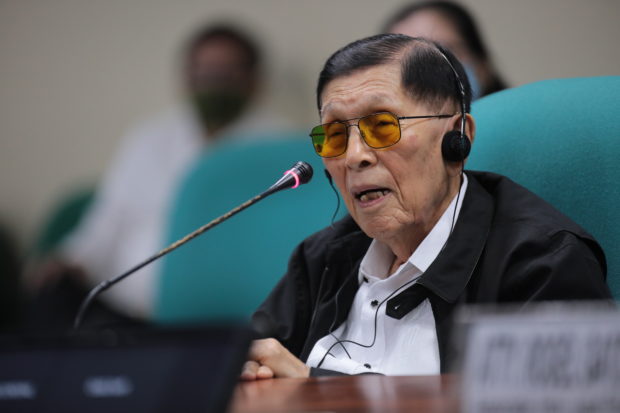Supreme Court dismisses coco levy case vs Enrile, et al.

Presidential chief legal counsel Juan Ponce Enrile (File photo from the Senate Public Relations and Information Bureau)
MANILA, Philippines — The Supreme Court has ordered the Office of the Ombudsman to dismiss the graft charges filed against former senator and now chief presidential legal counsel Juan Ponce Enrile and several others in connection with the coco levy funds, citing the violation of their constitutional right to a speedy disposition of cases.
Apart from Enrile, also covered by the order issued by the high court’s First Division are businessman Jose Concepcion, Rolando dela Cuesta, Narciso Pineda, and Danilo Ursua.
In a 53-page decision promulgated on Jan. 16 but made public on Wednesday, the court also ordered the dismissal of the same case against Eduardo Cojuangco Jr., Jose Eleazar, Maria Clara Lobregat, and Augusto Orosa in view of their supervening deaths.
However, in dismissing the case against those who had died, the court said the government may still file a civil action against their respective estates, citing the distinction made between criminal and civil liabilities under Article 89 of the Revised Penal Code.
If already filed, the separate civil action “shall survive notwithstanding the dismissal of the criminal case in view of their deaths,” the high court said.
Fund misuse
All the respondents were charged by the Presidential Commission on Good Government (PCGG) in February 1990 for the alleged misuse of the coco levy funds.
The PCGG had accused Cojuangco of using his influence to manipulate the Coconut Industry Development Fund (CIDF) to siphon off P840 million to his own firm, Agricultural Investors Inc.
“The Court finds that respondents Concepcion, Dela Cuesta, Enrile, Ursua, and Pineda’s constitutional right to speedy disposition of the cases was violated by the Ombudsman through the inordinate delay in concluding the preliminary investigation,” said the order written by Associate Justice Ramon Paul Hernando.
It noted that the preliminary investigation spanned more than eight years and that it was only in 1997 that any movement or action on the case actually began.
The high tribunal pointed out that under the Ombudsman’s Administrative Order No. 1, a fact-finding investigation should not exceed 12 to 24 months depending on the seriousness of the offense.
‘Already long delay’
It said the government failed to prove that it followed the prescribed procedure in the conduct of the preliminary investigation and the prosecution of the case, that the complexity of the issues and the volume of evidence made the delay inevitable, and that no prejudice was suffered by the accused as a result of the delay.
“With this case pending for over 30 years and possibly more without the assurance of its resolution, the Court recognizes that the tactical disadvantages carried by the passage of time should be weighed against petitioner Republic and in favor of the respondents,” the Supreme Court said.
“Certainly, if this case were remanded for further proceedings, the already long delay would drag on longer. Memories fade, documents and other exhibits can be lost and vulnerability of those who are tasked to decide increases with the passing of years. In effect, there would be a general inability to mount an effective defense,” it added.
“Consequently, the burden of proof shifted to petitioner Republic. However, petitioner Republic failed to discharge this burden, as petitioner Republic did not establish that the delay was reasonable and justified,” the court said.
While the government undoubtedly had all the resources to pursue cases of corruption and ill-gotten wealth, “the inordinate delay in this case may have made the situation worse for respondents,” it added.
“As the Supreme Court, we dutifully exercise cold impartiality while demanding accountability from the government and protecting the right of all people,” it said.
The late dictator Ferdinand Marcos Sr. (father of the President) and his associates were accused of colluding in a scheme to tax coconut farmers, with promises to develop the country’s coconut industry.
‘Public in character’
But the funds ended up in private companies, among them the United Coconut Planters Bank (UCPB) and San Miguel Corp. (SMC), benefiting Marcos’ cronies.
Catapulted to Malacañang by the 1986 Edsa People Power Revolution that toppled the Marcos regime, then President Cory Aquino created the PCGG to go after the alleged ill-gotten wealth of the deposed strongman’s family and cronies, including the coco levy funds.
In December 2001, the Supreme Court ruled that the coco levy funds were “public in character” but left it to the Sandiganbayan antigraft court to decide who owned the assets acquired with the funds.
In 2015, Malacañang certified as urgent a bill creating a trust fund for farmers, but it got stalled in the Senate.
In 2021, then-President Rodrigo Duterte signed the Coconut Farmers and Industry Trust Fund Act, creating a trust fund for the country’s coconut farmers.
In June of the following year, Duterte signed an executive order implementing the Coconut Farmers and Industry Development Plan, which aims to increase the productivity and income of coconut farmers, modernize their industry, and pave the way for the release of the P75-billion trust fund for farmers.
The fund consisted of coco levy assets that were earlier declared state property by the high tribunal.














